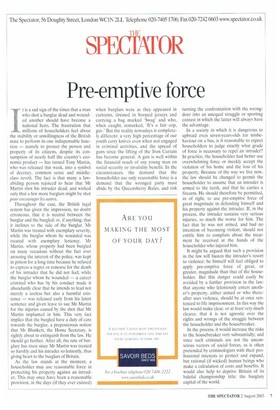SPECtATOR
Pre-emptive force
I. t is a sad sign of the times that a man who shot a burglar dead and wounded another should have become a national hero. The frustration that millions of householders feel about the inability or unwillingness of the British state to perform its one indispensable function — namely to protect the person and property of its citizens, despite its consumption of nearly half the country's economic product — has turned Tony Martin, who was released this week, into a symbol of decency, common sense and middleclass revolt. The fact is that many a lawabiding person rejoiced to hear that Mr Martin shot his intruder dead, and wished only that a few more burglars might be shot pour encourager les autres.
Throughout the case, the British legal system has given the impression, no doubt erroneous, that it is neutral between the burglar and the burgled: or, if anything, that it inclines to the side of the burglar. Mr Martin was treated with exemplary severity, while the burglar whom he wounded was treated with exemplary leniency. Mr Martin, whose property had been burgled on many occasions without the fact ever arousing the interest of the police, was kept in prison for a long time because he refused to express a regret or remorse for the death of his intruder that he did not feel; while the burglar whom he wounded — a career criminal who has by his conduct made it abundantly clear that he intends to lead not merely a useless but also a harmful existence — was released early from his latest sentence and given leave to sue Mr Martin for the injuries caused by the shot that Mr Martin implanted in him. This very fact implies that the burgled have a duty of care towards the burglar, a preposterous notion that Mr Blunkett, the Home Secretary, is rightly about to extinguish from the law. He should go further. After all, the rate of burglary has risen since Mr Martin was treated so harshly and his intruder so leniently, thus giving heart to the burglars of Britain.
As the law stands at the moment, a householder may use reasonable force in protecting his property against an intruder. This may once have been a reasonable provision, in the days (if they ever existed) when burglars were as they appeared in cartoons, dressed in hooped jerseys and carrying a bag marked 'Swag' and who, when caught, remarked, 'It's a fair cop, guy.' But the reality nowadays is completely different: a very high percentage of our youth carry knives even when not engaged in criminal activities, and the spread of guns since the lifting of the Iron Curtain has become general. A gun is well within the financial reach of any young man on social security or invalidity benefit. In the circumstances, the demand that the householder use only reasonable force is a demand that the wronged party must abide by the Queensberry Rules, and risk turning the confrontation with the wrongdoer into an unequal struggle or sporting contest in which the latter will always have the advantage.
In a society in which it is dangerous to upbraid even seven-years-olds for misbehaviour on a bus, is it reasonable to expect householders to judge exactly what grade of force is necessary to repel an intruder? In practice, the householder had better use overwhelming force or meekly accept the violation of his home and the loss of his property. Because of the way we live now, the law should be changed to permit the householder to assume that an intruder is armed to the teeth, and that he carries a firearm. He should therefore be permitted, as of right, to use pre-emptive force of great magnitude in defending himself and his property against the intruder. If, in the process, the intruder sustains very serious injuries, so much the worse for him. The fact that he was not armed, and had no intention of becoming violent, should not entitle him to complain about the treatment he received at the hands of the householder who injured him.
It might be argued that such a provision in the law will hasten the intruder's resort to violence; he himself will feel obliged to apply pre-emptive force of great, or greater, magnitude than that of the householder. But this danger could easily be avoided by a further provision in the law: that anyone who feloniously enters another's property, either armed or who thereafter uses violence, should be at once sentenced to life imprisonment. In this way the law would make clear, or at least very much clearer, that it is not agnostic over the rights and wrongs of the struggle between the householder and the housebreaker.
In the process, it would increase the risks to the housebreaker very substantially; and since such criminals are not the unconscious vectors of social forces, as is often pretended by criminologists with their professional interests to protect and expand, but rational (if wicked) human beings who make a calculation of costs and benefits. It would also help to deprive Britain of its baleful championship title: the burglary capital of the world.


























































 Previous page
Previous page